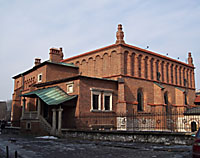Synagogues of the Kazimierz historic district in Krakow
All of Krakow’s seven synagogues are situated in the former
Jewish quarter of the town of
Kazimierz that developed from a tiny corner that
King Jan I Olbracht had earmarked in 1495 for Jews
transferred from the historic Krakow (i.e. today’s Old Town)
a kilometer or so away.
Two of the Kazimierz synagogues, Kupa at 27 Miodowa street
and Remuh at 40 Szeroka street, still serve Krakow’s
miniscule Jewish community as the venues for religious
ceremonies.
Synagogue is ‘synagoga’ or ‘boznica’ in Polish.

The Polish name: Stara Boznica. Address: 24 Szeroka street.
Poland’s oldest synagogue and arguably Krakow’s grandest one.
It was built in the early 16th century next to the
14th-century city walls. Destroyed by fire in 1557, the
brick building has acquired a Renaissance outer form during
the ensuing reconstruction, when the interior is basically
Gothic. The Nazis damaged it and turned to a warehouse, they
also executed 30 Polish hostages at its wall in 1943. The
synagogue has been restored in the years 1955-1957. Since
1961 the Old Synagogue serves as a museum of Jewish history,
culture, and tradition.
Opening hours are 10 a.m. – 2 p.m. on Mondays, 9 a.m. –
4 p.m.
Tuesday through Thursday and on weekends, and 10 a.m. –
5 p.m. on Fridays. Admission 8 zloties (PLN).
See more about the Old Synagogue in
Krakow

Remuh Synagogue
The Polish name: Synagoga Remuh. Address: 40 Szeroka street.
The smallest yet maybe the busiest of the Kazimierz synagogues,
and arguably also the most authentic one. The unassuming
Renaissance building was erected in 1558 by the Jewish cemetery
of the same name, established in 1533 and closed in 1800. Its
name commemorates saintly rabbi Moses Isserles Auerbach (born circa
1520, died 1572) a.k.a. Remuh (RaMa), religious writer-philosopher of
international fame, acknowledged miracle maker, and son of the
synagogue’s founder. His tomb in the adjacent Remuh Cemetery
still attracts pilgrimages of pious Jews. The synagogue and the
cemetery, both devastated under the Nazi rule, have been
restored in years 1958-1968 and 1956-1960 respectively. The
synagogue is the venue for religious services of orthodox Jews
in Krakow. Its interior boasts the original Aron Hakodesh, a
Renaissance stone cabinet for the Torah.
The Remuh Synagogue is the venue for religious services on Yom
Kippur and Rosh Hashanah.
Opening hours are 9 a.m. – 4 p.m. except Saturdays and Jewish
holidays when the synagogue is closed to tourists. Admission 5
zloties (PLN). Visitors should wear a skullcap or other headgear is
required.
Tempel (Temple) Synagogue
The Polish name: Synagoga Tempel. Address: 24 Miodowa street at
Podbrzezie street.
The neo-Romanesque building dates back to 1862 and was enlarged
in 1868, 1893, and 1924. It’s famous for its rich interior
lavishly decorated with ornate, gilded ‘Moorish’ woodwork.
Founded by Krakow’s Jewish progressives, it was
traditionally the venue for religious services attended by the
reformed Jews. Today it's the place where major events of the
Krakow Jewish community usually take place. The Tempel Synagogue often doubles as a concert
hall resounding with Jewish and classical music. There is a
mikveh for men on the premises, with the entry at 1 Podbrzezie
street,
Opening hours are 9 a.m. – 4 p.m. except Saturdays and Jewish
holidays when the synagogue is closed to tourists. Admission 10 zloties (PLN). Visitors should wear a skullcap or other headgear is
required.
Isaac's Synagogue
The Polish name: Synagoga Izaaka or Boznica Ajzyka. Address: 16
Kupa street at Izaaka street.
Funded by a fabulously rich local banker Isaac reb Yekele the
stately baroque structure dates back to 1644. It had undergone a
major refurbishment in 1857 and was completely damaged by the
Nazis during German occupation of Krakow in the WWII. The
synagogue has been reconstructed in the 1970s and the 1980s.
Isaac's Synagogue remains closed until further notice.
Kupa Synagogue
The Polish name: Boznica Kupa. Address: 27 Miodowa street.
The Kazimierz Jewish Town’s kehilla (kahal), a municipality,
founded the modest synagogue for the poor in 1643. The building
underwent many alternations in the ensuing centuries and
recently it has been meticulously restored. Its north side
adjoins the remnants of the medieval city walls of Kazimerz
while its southern flank is fully exposed at Warchauera street.
The Kupa Synagogue is the place where currently the Krakow Jews
gather for regular religious services on Sabbath and other
Jewish holidays.
The colorful interior of the Kupa Synagogue serves occasionally as the venue for
musical events.
Opening hours are 10 a.m. to 5 p.m. except Saturdays when
the synagogue is closed. Admission is 5 PLN.
High Synagogue (also known in the past as New Synagogue)
The Polish name: Synagoga Wysoka or Nowa Boznica. Address: 38
Jozefa street.
The upper floor of a late-Gothic building was turned into a
public place of worship in 1563 while everyday secular life went
on downstairs. The only authentic parts of the historic
synagogue are the front wall and its Renaissance portal, and the
remnants of the Aron Hakodesh in the former men’s prayer hall.
The building houses a photography exhibition called ‘Two
Faces of the Cracow Jews’ that shows the city’s prewar
Jewish community.
Opening hours are 10 a.m. – 6 p.m. Sunday through Thursday
and from 10 a.m. to 7 p.m. on Fridays and Saturdays. Admission 9 zloties
(PLN).
Popper’s Synagogue
The Polish name: Synagoga Popera. Address: 16 Szeroka street.
One has the best view of the outer shape of that squat building
with thick walls at Dajwor street. Its architecture is of the
Baroque period but austere. It dates back to 1620 and bears the
name of the founder of the synagogue, one Wolf Popper a.k.a.
Wolf Bocian (‘Stork’), a wealthy Jewish merchant. Popper’s
Synagogue was famous for its lavish furnishings but nothing has
survived till now. Its building houses a local youth culture
center.
|
Stroll through
Krakow's Kazimierz District
Watch
Jewish sites in Krakow on video
online
Old Synagogue
The Kazimierz Jewish quarter was the safe haven for Jews from
every corner of Europe till the 20th c. and a major center of
the Diaspora.
Auschwitz
Jewish Ghetto in Krakow
Plaszow concentration camp
Poland's prime tourist
attraction and a must in Central Europe boasts numerous
world-class monuments, charming vistas, delightful atmosphere,
and the best restaurants.
Krakow's landmarks
In the proximity
of Krakow
Krakow is Poland's tourist mecca, and also a gateway to
many other must-see sites in the region.
|




